|
De Duitse schrijver Leopold Ritter von Sacher-Masoch werd geboren op 27 januari 1836 in Lemberg. Zie ook alle tags voor Leopold von Sacher-Masoch op dit blog.
Uit: Venus In Furs (Vertaald door Fernanda Savage)
“Why not?" she said, "and take note of what I am about to say to you. Never feel secure with the woman you love, for there are more dangers in woman's nature than you imagine. Women are neither as good as their admirers and defenders maintain, nor as bad as their enemies make them out to be. Woman's character is characterlessness. The best woman will momentarily go down into the mire, and the worst unexpectedly rises to deeds of greatness and goodness and puts to shame those that despise her. No woman is so good or so bad, but that at any moment she is capable of the most diabolical as well as of the most divine, of the filthiest as well as of the purest, thoughts, emotions, and actions. In spite of all the advances of civilization, woman has remained as she came out of the hand of nature. She has the nature of a savage, who is faithful or faithless, magnanimous or cruel, according to the impulse that dominates at the moment. Throughout history it has always been a serious deep culture which has produced moral character. Man even when he is selfish or evil always follows principles, woman never follows anything but impulses. Don't ever forget that, and never feel secure with the woman you love.
(…)
“Love knows no virtue, no profit; it loves and forgives and suffers everything, because it must. It is not our judgment that leads us; it is neither the advantages nor the faults which we discover, that make us abandon ourselves, or that repel us.
It is a sweet, soft, enigmatic power that drives us on. We cease to think, to feel, to will; we let ourselves be carried away by it, and ask not whither?”
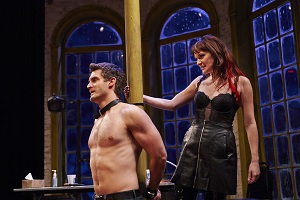
Leopold von Sacher-Masoch (27 januari 1836 – 9 maart 1895)
Vanessa Wasche (Vanda) and Michael Brusasco (Thomas) in een opvoering in Cleveland, 2013
De Amerikaanse schrijver Ethan Mordden werd geboren op 27 januari 1947 in Pennsylvania. Zie ook alle tags voor Ethan Mordden op dit blog
Uit: Coming Up Roses
“Broadway had some problems, widely assumed to be minor. The overexpansion of New York theatre realty in the boom years of the 1920s saw the second half of the overloaded 1927-28 season in real distress, with too many productions for an audience that had reached its maximum and could not expand further. A year later, the Stock Market Crash cut this audience back and tightened the flow of capital for new productions; simultaneously the development of the talking film lured away customers even more than the silent film had. The "road" shrank, from a gleeful network of anything and everything to a solemn touring of Broadway hits.
In all, this was regarded as regrettable but unavoidable. After all, what was lost was supposed to be a glut of lowly genre productions--the murder mysteries, domestic comedies, cheesy revues, and melodramas that no one really cared about, anyway. Oh--there was television, too. But in 1950 this was a laughable novelty, with its tiny black-and-white screen, its spotty scheduling on a mere four networks, its kiddie shows and Amos 'n' Andy and Milton Berle.
So the American theatre was on a roll, fielding some fifty-one productions in Broadway's 1949-50 season. (This is to ignore evenings of dance and Gilbert and Sullivan that occupied legitimate theatres that year.) Fifteen of these fifty-one shows were musicals, and perhaps a good place to start would be with Big Broadway, in a star vehicle produced by Leland Hayward for Ethel Merman with an Irving Berlin score, a Howard Lindsay-Russel Crouse book, direction by George Abbott, and choreography by Jerome Robbins: Call Me Madam (1950).
In fact, this is an ideal jumping-off place, for Call Me Madam is prototypal, a conventional piece in every respect. Technically an "original" (that is, not based on a prior source), it is little more than a three-hour novelty act--Merman as our ambassador to a tiny European country. Her character, Sally Adams, was modeled on Perle Mesta, a Washington, D.C., partygiver whose service to the Democrats was rewarded with just such a post, in Luxembourg. But the real fun in Call Me Madam lay in watching our anything-but-tactful Merman taking on the diplomatic set."
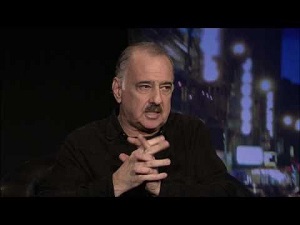
Ethan Mordden (Pennsylvania, 27 januari 1947)
De Duitse schrijver Benjamin von Stuckrad-Barre werd op 27 januari 1975 in Bremen geboren. Zie ook alle tags voor Benjamin von Stuckrad-Barre op dit blog.
Uit: Wa!
„Der Himmel reißt auf – es wird, es wird, es wird!“, feuert Ben Wettervogel draußen, vor dem ZDF-Frühstücksfernsehcafé Unter den Linden den Tag an; den Tag, die Sonne, die Stadt, die Menschen, das Land. Links und rechts von ihm braust der Hauptstadtverkehr, der Meteorologe steht auf dem sich mittig des Boulevards erstreckenden Trottoir und freut sich über diesen viel zu warmen Herbst, dann gibt er „zurück zu Patrizia“, die im Café nun zwei Kaffeetassen verlost; zur halben und zur vollen Stunde gibt es Nachrichten.
Ein paar Hundert Meter weiter, am Brandenburger Tor, steigt Klaus Wowereit aus einem dunklen Dienstschlitten, knöpft sein Jackett zu und sagt „So!, na, dann woll’n wa mal.“ Was will er denn? Er will einen Staatsbesucher empfangen, den Präsidenten des Staates Benin. Aber der Gast ist noch nicht da. „Wie spät ha’m wa’t denn?“ will Wowereit wissen, stolz, dass er selbst pünktlich ist. Kurz vor neun ham wa’t. Sofort ist man dabei, sofort ist man „wa“ – wa, das heißt hier wir, und es heißt in Berlin auch, am Ende eines Satzes, ansteigend intoniert: Hab’ ich recht oder hab’ ich recht?
Klaus Wowereit, das muss man zwischendurch immer mal wieder festhalten, ist homosexuell und regiert die deutsche Hauptstadt gemeinsam mit den verpeilten Kommunisten der PDS. Nur mal so, als Hinter-, nein, Vordergrund. Falls Sie uns gerade im bergischen oder badischen oder sogar bayerischen Land lesen.
Knallblauer Himmel, es ist geworden, es ist geworden, es ist geworden. Die Herbstsonne güldet auf die Hauptstadtpracht, „schön, wa?“, stellt Klaus Wowereit fest, und sogleich ha’m wa dieses Jefühl, dass sich in seiner Nähe stets einstellt: Überschuldung hin oder her, so schlecht ist Berlin nicht. Läuft doch allet. Und weil bzw. damit es läuft, rennt er, der Regierende Bürgermeister, durch die Stadt. Klaus Wowereit, denkt man, ist eher Psychologe als Politiker, und das sogenannte Hauptstadtparkett ist seine Couch. Gruppentherapie: Da kommt eine Touristengruppe, Wowereit dreht auf. Die Sicherheitsbeamtenaugen flackern lagecheckend, dieser Mann ist unbewachbar. Man muss aber ohnedies eher die Bürger vor ihm beschützen, er schüttelt jede Hand, sucht jedes erdenkliche Geplauder. Die Touristen haben einen Kreis um ihn herum gebildet und fragen sich, was sie ihn jetzt fragen sollen."

Benjamin von Stuckrad-Barre (Bremen, 27 januari 1975)
Ex burgemeester van Berlijn Klaus Wowereit (rechts)
De Engelse dichter en schrijver Lewis Carroll werd op 27 januari 1832 in Daresbury geboren. Zie ook alle tags voor Lewis Caroll op dit blog.
Uit: Alice in Wonderland
“Oh dear, what nonsense I'm talking!'
Just then her head struck against the roof of the hall: in fact she was now more than nine feet high, and she at once took up the little golden key and hurried off to the garden door.
Poor Alice! It was as much as she could do, lying down on one side, to look through into the garden with one eye; but to get through was more hopeless than ever: she sat down and began to cry again.
'You ought to be ashamed of yourself,' said Alice, 'a great girl like you,' (she might well say this), 'to go on crying in this way! Stop this moment, I tell you!' But she went on all the same, shedding gallons of tears, until there was a large pool all round her, about four inches deep and reaching half down the hall.
After a time she heard a little pattering of feet in the distance, and she hastily dried her eyes to see what was coming. It was the White Rabbit returning, splendidly dressed, with a pair of white kid gloves in one hand and a large fan in the other: he came trotting along in a great hurry, muttering to himself as he came, 'Oh! the Duchess, the Duchess! Oh! won't she be savage if I've kept her waiting!' Alice felt so desperate that she was ready to ask help of any one; so, when the Rabbit came near her, she began, in a low, timid voice, 'If you please, sir—' The Rabbit started violently, dropped the white kid gloves and the fan, and skurried away into the darkness as hard as he could go.
Alice took up the fan and gloves, and, as the hall was very hot, she kept fanning herself all the time she went on talking: 'Dear, dear! How queer everything is to-day! And yesterday things went on just as usual. I wonder if I've been changed in the night? Let me think: was I the same when I got up this morning? I almost think I can remember feeling a little different. But if I'm not the same, the next question is, Who in the world am I? Ah, that's the great puzzle!' And she began thinking over all the children she knew that were of the same age as herself, to see if she could have been changed for any of them.”
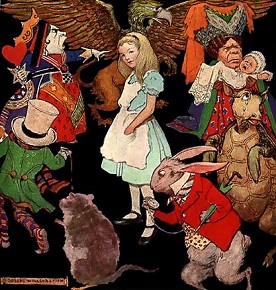
Lewis Carroll (27 januari 1832 – 14 januari 1898)
Illustratie door Jessie Willcox Smith, 1923
De Nederlandse dichter en schrijver Rudolf Geel werd geboren in Amsterdam op 27 januari 1941. Zie ook alle tags voor Rudolf Geel op dit blog.
Op reis
De omstreken van Dublin
jij reisde door dit droeve land
en ook ik
het was een guur dagje
soms een beetje zon op de weg
De buschauffeur met zijn gebogen tong -
hoeveel keer eerder wist hij in de verte
Stefan Daedalus' Martello-tower aan te wijzen
het rotspad naar Shaws woning
de overblijfsels van een klooster
(middeleeuws en winters)
Glendaloch: het samenstromen van
de wateren
In de diepte, afgegleden van
de stille heuvels
die gods adem vasthielden
en daarna waren vergeten
‘Binnen deze kruisen
was de mens vrij en onschendbaar’
onthulde de voerman, en hij leidde
ons naar het kruis der wensen
Maar hij keek
of de wensen tegenwoordig
niet uitkwamen; men trof hem
hier al jaren en hij moest er nog
jaren blijven komen
En of hij zich vrij voelde
en onschendbaar -
Al rijdende reciteerde hij
‘het samenvallen van de wateren’
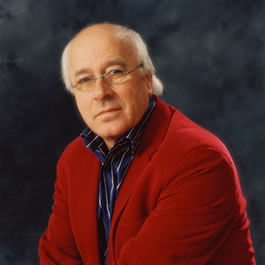
Rudolf Geel (Amsterdam, 27 januari 1941)
De Franstalige, maar oorspronkelijk Nederlandse schrijfster Neel Doff werd geboren in Buggenum op 27 januari 1858. Zie ook alle tags voor Neel Doff op dit blog.
Uit: Keetje Tippel
“Wij woonden in een kelder aan de Utrechtsedwarsstraat. Het was nacht. Hein en ik lagen met twee van de andere kinderen op onze strozak op de grond. Wij waren op onze buik gaan liggen, ons gezicht in het kussen gedrukt.
‘Ik zie cirkels,’ zei Hein, ‘ze gaan heen en weer, eerst worden ze groot en dan weer kleiner; ze zijn geel, groen en paars; het lijkt wel of er een lamp achter brandt, zo licht zijn ze...’
‘De mijne zijn rood, blauw en oranje,’ zei ik. ‘Ze worden almaar groter, zo groot als de kamer, en ze draaien heel vlug in de rondte... o, nu veranderen ze, er zijn er nu heel veel, klein en in allerhand kleuren, en dan zijn er nog een heleboel piepkleine lichtjes die met ze meedraaien. Mooi is dat, joh, mooi...! en wat zie jij nu?’
Hein antwoordde niet meer, hij was in slaap gevallen.
Ik hield mijn gezicht nog even in het kussen, maar ik kreeg het kriebelig door de warmte van de lichamen en het bed, en door de vlooien. Ik ging overeind zitten. Het was donker in ons hol; allen door het venstertje van de kachel en het deksel ervan dat iets omhoogstond, kwam wat licht naar buiten. De grote schoenen van vader, die midden op tafel stonden, leken in het donker heel verschrikkelijk. Mijn broertjes en zusjes waren allemaal in slaap; Hein had ons hondje in zijn armen en de kat had zich tegen Dirk aangenesteld. De deuren van de bedstee waar mijn ouders met de baby in sliepen stonden open; het schijnsel van de kachel gleed over het gezicht van moeder dat in de lichte rand van haar nachtmuts zo mager was, zó mager... ik werd er bang van, maar het luide geronk van vader stelde me weer gerust.
Ik ging liggen. Maar rust kon ik niet vinden, ik woelde en huiverde en het leek wel of de strozak nat werd.
‘Moeder! moeder!’
‘Ja, wat is er?’
‘Ik geloof dat Dirk geplast heeft, het bed is kletsnat, 't brandt aan mijn vel.’
‘Wat kan ík daaraan doen? Ga slapen en laat me met rust.’
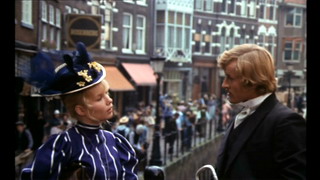
Neel Doff (27 januari 1858 – 14 juli 1942)
Scene uit de film “Keetje Tippel” met Monique van de Ven en Rutger Hauer, 1975
Zie voor nog meer schrijvers van de 27e januari ook mijn blog van 27 januari 2013 deel 1 en ook deel 2 en eveneens deel 3.
27-01-2015 om 16:25
geschreven door Romenu 
Tags:Leopold von Sacher-Masoch, Ethan Mordden, Benjamin von Stuckrad-Barre, Lewis Carroll, Rudolf Geel, Neel Doff, Romenu
|

